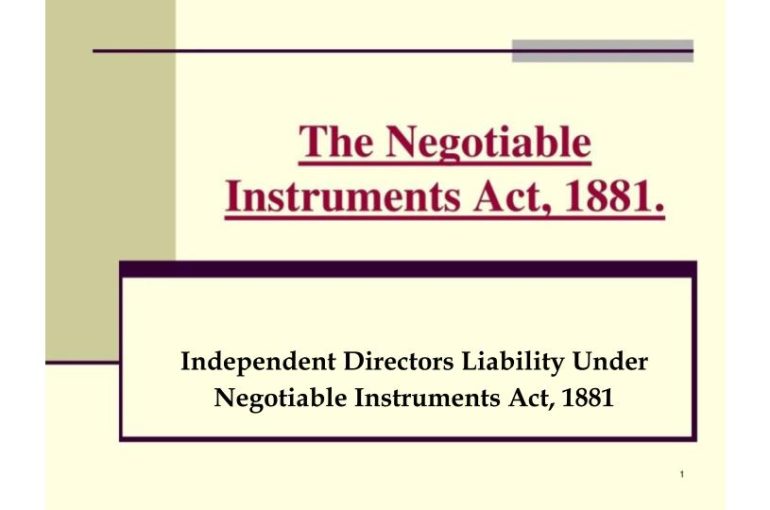Independent Directors Liability Under Negotiable Instruments Act, 1881
Introduction
The Supreme Court of India, in its recent ruling in Kamal Kishor Shrigopal Taparia v. India Ener-Gen Private Limited & Anr., 2025 INSC 223 has reaffirmed the principles governing vicarious liability under the Negotiable Instruments Act, 1881 (“NI Act”). This judgment provides clarity on the liability of independent non-executive directors in cheque dishonour cases under Section 138 read with Section 141 of the NI Act. The Court quashed the criminal proceedings against the Appellant, reinforcing the legal requirement of specific averments detailing a director’s role in the company’s financial affairs.
Background of the Case
The case arose from complaints filed under Section 138 of the NI Act against the Appellant, an independent non-executive director of M/s D.S. Kulkarni Developers Ltd., in relation to dishonoured cheques issued by the company. The Appellant sought quashing of these proceedings, arguing that he was not involved in the financial affairs of the company and had resigned prior to the issuance of the cheques.
Metropolitan Magistrate’s Court Verdict
The complaints against the Appellant were filed before the Learned Metropolitan Magistrate 28th Court, Esplanade, Mumbai. The Court took cognizance of the matter and proceeded with the trial, implicating the Appellant along with other directors. The Prosecution argued that, as a director, the Appellant bore vicarious liability for the dishonoured cheques, despite his claims of non-involvement in the company’s financial decisions.
Bombay High Court
The Appellant filed a petition under Section 482 of the Code of Criminal Procedure (“CrPC”) before the Bombay High Court seeking quashing of the criminal proceedings. The High Court dismissed his plea, ruling that the Appellant’s role in the company was a matter of trial and not one to be determined at the pre-trial stage. The Court observed that the complainant had made sufficient averments about the Appellant’s involvement, which required judicial examination during trial
Supreme Court
The Supreme Court overturned the High Court’s ruling and quashed the criminal proceedings against the Appellant. The Court reasoned that:
- Vicarious Liability Requires Specific Allegations
- The Court reiterated that a mere designation as a director does not automatically attract liability under Section 141 of the NI Act.
- It emphasized that for a director to be held vicariously liable, there must be specific averments demonstrating active involvement in the conduct of business at the relevant time.
- Precedents Supporting the Decision
- The Court relied on National Small Industries Corporation Ltd. v. Harmeet Singh Paintal (2010) 3 SCC 330, which established that vicarious liability under Section 141 must be strictly construed.
- The Court also cited Pooja Ravinder Devidasani v. State of Maharashtra (2014) 16 SCC 1, which held that independent non-executive directors cannot be held liable unless there is clear evidence of their involvement in the company’s affairs.
- Resignation Before the Issuance of Cheques
- The Appellant had resigned on May 3, 2017, and his resignation was duly notified to the Registrar of Companies.
- Since the dishonoured cheques were issued after his resignation, he could not be held responsible for them.
- Lack of Specific Allegations Against the Appellant
- The complaints did not contain specific allegations detailing how the Appellant was responsible for the dishonoured cheques.
- The Court noted that general statements implicating all directors were insufficient to establish liability.
Conclusion
The Supreme Court’s ruling in this case sets a significant precedent in protecting independent non-executive directors from unwarranted criminal prosecution under the NI Act. It reaffirms that vicarious liability cannot be presumed and must be substantiated with specific allegations demonstrating active involvement in the company’s financial operations.
By quashing the criminal proceedings against the Appellant, the Court has reinforced the principle that liability under Section 141 of the NI Act is not automatic and must be supported by clear and unambiguous allegations. This judgment will serve as a guiding authority in future cases involving corporate liability and cheque dishonor under the NI Act.
Shikha Pandey
Associate
The Indian Lawyer & Allied Services
Please log on to our YouTube channel, The Indian Lawyer Legal Tips, to learn about various aspects of the law. Our latest video, titled; “Special Law Vs. General Law” can be viewed at the link below:





































Leave a Reply